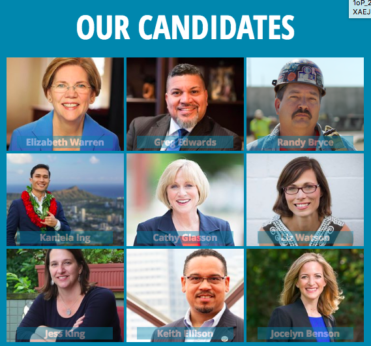
2019 ILCA PW Winner, SECOND PLACE Saul Miller Award, Organizing
WASHINGTON—It takes more than a mound of money to win an election, as 450 progressive candidates learned in seminars sponsored by the Progressive Change Campaign Committee at a four-day conference in D.C.
 It takes savvy in handling the media, an introductory speech that links their causes to their lives (and the lives of their listeners), kitchen-table economics and, most importantly, it takes a willingness, as speakers emphasized over and over again, to “be yourself.”
It takes savvy in handling the media, an introductory speech that links their causes to their lives (and the lives of their listeners), kitchen-table economics and, most importantly, it takes a willingness, as speakers emphasized over and over again, to “be yourself.”
That’s what a random sample of interviews of attendees at the conference, who spent their first day alternating between the seminars and listening to Sens. Bernie Sanders, Ind.-Vt., and Elizabeth Warren, D-Mass., discovered.
The candidates, many of them first-timers, are running on both national and local issues, ranging from Medicare for All to fixing local roads. Half are women, 40 percent are minority, 18 percent are unionists—not counting those who are children and grandchildren of unionists—and 20 percent are LGBTQ.
They’re running in red, blue, and purple states, all with the objective of advancing a progressive agenda on behalf of workers and their families. And they’re preaching down-to-earth issues that relate their stories and their goals to those of the people they talk with, one-on-one.
Rachel Ventura, the daughter and granddaughter of an AFSCME member-mother and a Teamster father, said her seminar concentrated on how candidates must keep on message. In her race for the Will County, Ill., board’s 9th District, she’s hitting both national and local issues: Medicare for All, but also more state funds to local schools.
She has another one, too: Failing multi-employer pension plans. Her father, mother, and uncle just sold their 80-acre farm in Michigan. Her father is afraid the financially troubled Teamsters Central States Pension Plan will cut its payments, and “he’s scared for his pension.” Congress has appointed a commission, including several Midwestern lawmakers, to try to solve the multi-employer problems.
Jen McMillan, the daughter of a Teamster who seeks an open GOP-held Decatur-area seat in the Illinois General Assembly, talked a kitchen-table issue: Falling state aid to local schools.
The three-year Illinois budget deadlock between right-wing GOP Gov. Bruce Rauner and the Democratic-run legislature hit Richland Community College, where McMillan’s a consultant, hard. The state’s budget crunch was so bad for local schools, she tells people on the campaign trail, that “45 percent of Illinois high school graduates last year left the state to go to college. We can’t afford that.”
Rauner, a wealthy trader, tried to use the budget deadlock to crush AFSCME, which represents 40,000 state and local workers. Resulting non-payment and late payment of state aid hit local schools—and the rest of state and local government, plus outside services it funds.
Ventura’s Will County colleague, 5th County Board District hopeful Meta Mueller—whose doctoral thesis was on German and Irish creation of Chicago’s unions in the late 1800s—chimed in on the schools and other issues. The first-time candidate’s seminar talked about different ways to raise money: House parties versus larger fundraisers.
“House parties are more intimate and people get to know you, and they ask to volunteer,” but donations are smaller and you have to figure out in advance who to invite, she explained. “A fundraiser is a little more formal. People come from bigger organizations,” such as unions. Donations are larger.
“You also have to do opposition research,” on your foes and yourself, to be ready for anything the foes throw at you, Mueller added. “When you walk out your front door, they told us, you’re in public life.”
“Stick to your values. Stick to your values. I’ve had consultants tell me ‘Don’t put a D [for Democrat] in front of your name. But sticking to my values is worth it,” said Mueller, wife of an IBEW Local 701 member.
“I was once homeless, on Medicaid, needed food stamps. We need someone in Congress who can empathize” with people suffering through such economic ills, said Amy Vilela, a candidate in Nevada’s 4th Congressional District in the Las Vegas suburbs. Now a college graduate who has held managerial positions, Vilela faces seven other Democrats in the June 12 primary for an open seat.
“I’m running because my daughter died” when insurance would not pay for her illness treatments, Vilela said. “We need Medicare for All,” a key progressive cause enthusiastically pushed and welcomed at the PCCC event.
“My takeaway from the seminars? Perseverance,” the daughter and granddaughter of Ironworkers said. “Remembering who you are and why you’re running is important when you’re not a typical candidate.” In her case, being “not typical” is taking on retired Senate Majority Leader Harry Reid’s Nevada Democratic machine “and reaching across the aisle” to work on legislation.
Vilela’s also refusing corporate campaign committee contributions, just as a recent successful Democrat did in winning an open U.S. House seat in southwestern Pennsylvania—in a district then-GOP nominee Donald Trump carried by 20 percentage points.
But to do that, Vilela must ask for dollars, an uncomfortable task, and the seminar taught her how to “pivot” in speeches to do so. The PCCC provided the candidates with sample donation request scripts. But then “to me, it’s very important to come back to what your platform is. Mine is we need representation for the people,” not the 1 percent, another conference theme.
“In order to fight Trump, we have to stop fighting him from the right,” Vilela adds.
Another seminar handled how to construct media events and public relations, and talking with reporters, especially important in local races, said another Will County hopeful, Mimi Cowan, who seeks the 11th District seat at the county’s northern edge.
“They’re teaching us how to reach out and build contacts with the media,” she said. “It’s everything from the bird’s eye view on Twitter to town halls to how to have traditional press conferences.”

Cowan’s neighbor, Lauren Underwood, is the Democratic nominee against incumbent GOP U.S. Rep. Randy Hultgren in Illinois’ 14th District. Underwood, “a 31-year-old African-American millennial, is a really dynamic candidate,” Cowan said. Cowan added she’s taking notes to share with Underwood.
The PCCC also provided another valuable item in a large group session: A poll it commissioned of Americans’ views nationwide on selected issues progressives are pushing. The votes for many of the causes were overwhelming.
Among them, universal pre-kindergarten, a favorite cause of the American Federation of Teachers (77 percent for-15 percent against), fair trade that protects workers (75-11), debt-free college education (71-19, including 56 percent of Republicans), expanding Social Security benefits (70-15 including 62 percent of Republicans), and Medicare for All.
PCCC actually took two polls on that. Government-run single-payer Medicare for All, as Sanders and Warren advocate, eliminates the insurance companies and won 51-36. An opt-in system, letting people choose between insurers and Medicare, won 71-13. “We’re talking to Sanders’ staff about that,” said PCCC co-founder Adam Green, who presented the survey findings.










